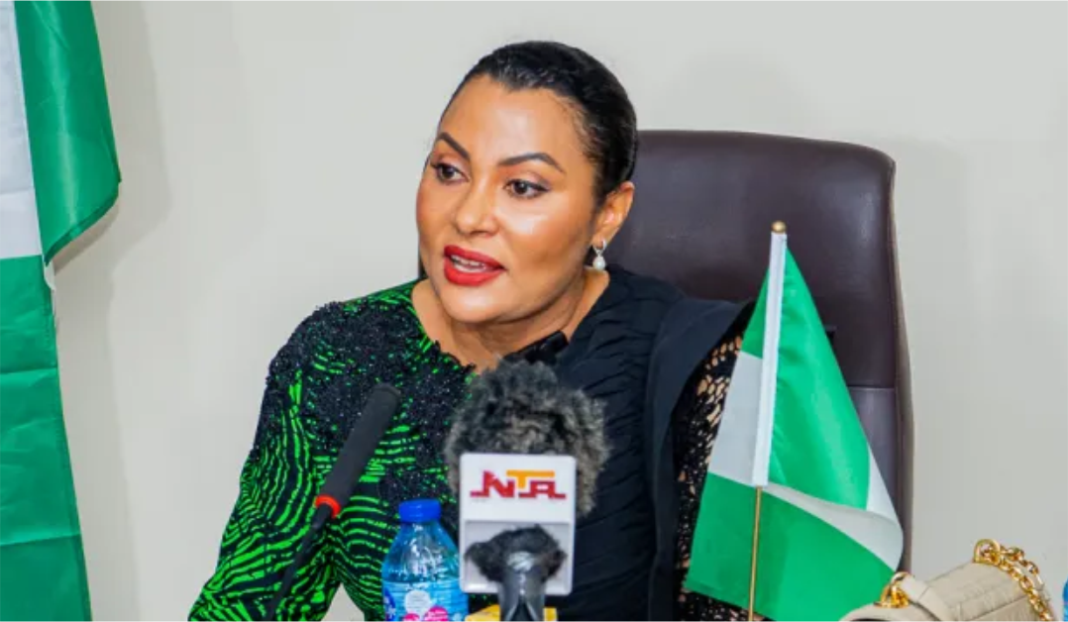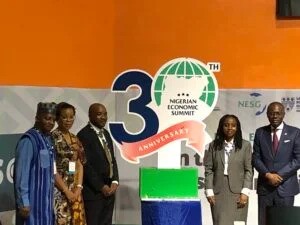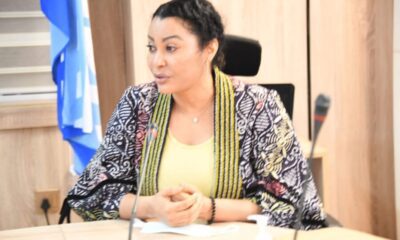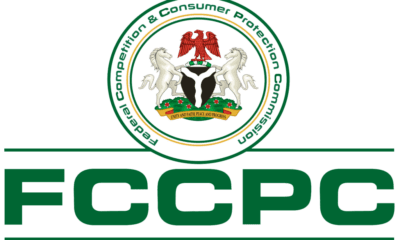News
Nigerian Govt to fund Student Loan Scheme through Education Tax – FIRS Chairman
The Nigerian Government has said the Student Loan Scheme would be funded through the Education Tax Fund, under the Federal Inland Revenue Service, FIRS.
FIRS Chairman, Zacch Adedeji revealed this on Monday while briefing State House Correspondents alongside the Executive Secretary of the Board, Dr Akintunde Sawyerr, at the Presidential Villa, in Abuja.
According to Adedeji, the deployment of the Education Tax Fund in the scheme is one of the ways the government can be accountable to taxpayers in the country.
In his remarks, Sawyerr also assured that the process for applying for the loan would be devoid of human intervention as every action would be undertaken on an App specifically designed for the purpose.
He explained that the government was keen to ensure that young Nigerians do not fail to acquire tertiary education just because of lack of funds to continue their studies.
According to him, the implementation of the student loan scheme would enable Nigerians to pick a career trajectory of their choice rather than being forced to do something else because they were unable to acquire requisite education due to lack of funds.
Sawyer also affirmed that the loan would help to stem the dangerous journeys undertaken by Nigerian youths across the Sahel to Europe in search of a better life.
He further disclosed that school fees for successful applicants would be transferred directly to their institutions, noting that while every Nigerian was eligible to apply for the loan, only the most needy would be supported.
Sawyerr said, “It’s a pleasure to be here today to brief you on the impending launch of the Nigerian Education Loan Fund, which is the bedrock that will operationalize the student loan scheme in Nigeria. It’s a great opportunity to help solve an age-old problem that has been on in this dear nation of ours for quite some time.
“There are many, many people with great capacity and with the desire to improve their education. And usually the place where that falls down is when they get into the tertiary base. At that point they really have a number of options, either to go into the world of work with qualifications that are not necessarily optimal for them or to find ways of funding that tertiary space.
“When I say tertiary, some of it is academic. So university education is generally regarded as academic but this programme seeks to provide opportunities for Nigerian students who want to go into the academic side and get a university degree or perhaps want to go into the technical side and go and acquire some vocational skills and some vocational qualifications which is always needed in society, and also in the teacher training space. Because you know, without teachers, really none of us are going very far. We have to learn from others and we have to have teachers.
“So, this is a great opportunity for that applicant, and they are the ones that are at the center of all of this. This act, effectively the intention behind it is to ensure that the reason for not being able to go on and further your education at a tertiary level, is not for the lack of finance.
“This law seeks to bridge the gap between the desire to study and the capacity to go further. It seeks to bridge that gap that is created by lack of finance, lack of funding.”
He added, “I want to say to you that this has been done with a lot of thought. So in application and in applying for this loan, there is zero human intervention. In other words, there is an app. The applicant will go on to a portal, they will engage with that app.
“They will have to put in certain pieces of information which made them eligible, that is their JAMB number, and of course the tie-in to their date of birth. Further pieces of information include things like their national identity number, NIN, which confirms that they are Nigerians.
“This loan scheme is being paid for by Nigerian tax payers. So it’s for Nigerians and the NIN helps verify and qualify them as such.
“Their BVN is needed for financial inclusion because this scheme will at some point be able to empower students. So we need to know they have bank accounts. We need to know where their accounts are, to be able to access those accounts.
“It will also have their matric number, admission number so that we can firmly establishment which institution they are going because one of the key elements of this is that once we’ve received applications and those applications are approved, the fees or the tuition requirements in terms of financials will be transferred directly to the institution.
“That in itself has benefits for the institution. Many many students are struggling to pay their fees, their parents are struggling to pay their fees. There’s a very high dropout rate. So it’s one thing to get into the tertiary institution. It’s another thing to stay there for four years or for three years. This scheme seeks to help people access and remain until they qualify or graduate.”
Explaining further, Adedeji said, “This is in fulfillment of Mr President’s promise that we will make education accessible to all. And while I have to put my own is because of the source of funding. This is one of the schemes that we will apply Education Tax that we will collect. So, this is a way of being accountable to the taxpayer because the essence of Education Tax is to consolidate and restore education integrity and quality.
“And in fulfilling that part of the Act, so, that is why Education Tax Fund is one of the sources of funding, by God’s grace, that we’ll use actually to execute this laudable programme.”
News
Application deadline for management of Nigeria’s $10bn Diaspora Fund extended


The Nigerian federal government has shifted the application deadline for companies interested in managing the $10 billion Diaspora Fund.
Minister of the Federal Ministry of Industry, Trade and Investment, Doris Uzoka-Anite, disclosed this in a circular on Thursday in Abuja.
Accordingly, the deadline for May 6 has been shifted to May 13, 2024.
The minister urged prospective applicants to utilise the extra time to complete their submissions, ensuring they are thorough and competitive.
She stressed that the extension is designed to allow stakeholders additional time to adequately prepare their applications following the guidelines established for the fund.
“The Federal Ministry of Industry, Trade, and Investment wishes to inform all interested parties that the deadline for the submission of Expressions of Interest (EOI) for the Nigeria Diaspora Fund has been extended.
“The new submission deadline is May 13, 2024. This extension is intended to accommodate stakeholders who require more time to prepare their applications by the guidelines provided for the $10 billion Nigeria Diaspora Fund,” she stated.
News
Sanwo-Olu, NESG harp on PPP for economic growth


Gov. Babajide Sanwo-Olu of Lagos State has emphasised the role of public-private sector partnerships in driving accelerated sustainable economic growth in Nigeria.
He made the remark at the Nigerian Economic Summit Group (NESG) Public Lecture and Founders’ Forum held at the Lagos Business School on Thursday.
The event, which marked the official launch of the 30th anniversary of the Nigerian Economic Summit (NES) has the theme: “In the National Interest: Reflecting on the Past, Reimagining the Future.”
Sanwo-Olu said it was imperative that the public sector improved on its synergy with various actors pursuing a collective agenda of service for the citizens.
The governor highlighted the significant role the NESG plays in bringing together public and private sector leaders in the country in an ongoing dialogue to shape, influence and create a thriving competitive and successful economy.
“We’re not where we should be and we must continue to set goals to inspire ourselves to do better as a nation
“We may not always achieve our targets for our vision timelines, but that should not be an excuse for not trying,” he said.
He commended the NESG for its various interventions such as the flagship annual summit, roundtable and sectorial policy commissions, technical support work and policy innovation centre.
He, however, urged NESG to explore ways of deepening linkage between policy work and public consciousness that allows engagement with the citizenry.
Delivering the lecture, Mrs Ifueko Omoigui-Okauru, Managing Partner, Compliance Professionals PLC, said that while there had been significant economic changes, more needed to be done to ensure accelerated economic growth.
Omoigui-Okauru said that there was need to build inclusive policies that reflect the realities of the nation rather than imposing replicas of other countries.
“In 30 years, we may have made some progress, but we can’t say we have radically transformed Nigeria.
“As we reflect on the NESG, there’s still a lot to be done in bridging the rural-urban divide and have an inclusive agenda.
“We see our journey as work in progress. We need to determine the parameters that would drive our success and put policies in place to move us in the direction where we need to be.
“It is important for us to move away from self interest, think of ways to use technology and other frameworks to collectively achieve the Nigeria of our dreams,” she said.
Earlier in his opening remarks, Mr Niyi Yusuf, Chairman, NESG, said the 30th Summit reaffirmed the essentiality of public-private partnerships in tackling complex economic realities.
Yusuf, however, said that the journey to embracing market mechanisms has not been without its challenges.
He reiterated unwavering commitment in driving reforms through rigorous research, economic and social programmes, and inclusive summits, all aimed at shaping the socio-economic development of our nation.
“Thirty years ago, at a critical juncture in our nation’s history, the NES was born out of a necessity when the winds of economic challenges blew fiercely, necessitating a platform for robust public-private dialogue.
“Since our inaugural summit in 1993, the NES has been a progressive economic discourse rooted deeply in collaborative efforts between government leaders and private sector visionaries.
“Each Summit has crafted policies and strategies essential for removing barriers to competitiveness, growth, and inclusive development.
“Therefore, in commemorating this 30th anniversary, it is essential to assess and discuss the role of this public-private dialogue platform in Nigeria’s socio-economic landscape to provide us insights for future engagements,” he said.
The chairman assured collaborative efforts with the three arms of federal and subnational governments and private sector communities to propel Nigeria towards a more resilient, inclusive and prosperous future.
Dr Pascal Dozie, Chairman, NESG Advisory Board, listed political, economic, education and environment sectors as pathways to reimagining Nigeria’s future
Dozie, also pioneer Chairman of NESG Board of Directors, was represented by Mr Frank Aigbogun, Chief Executive Officer of BusinessDay.
He charged NESG to adopt new strategies in providing collaborative leadership in seeking answers to the following crucial questions.
“How do we strengthen democratic institutions and rule of law, foster culture of inclusiveness and representation?
“How do we promote transparency and accountability in governance and inculcate the culture of consequences for bad behaviour in every sphere of life?
“In economic reimagining, how do we diversify Nigeria’s economy, reduce dependence on oil, foster a business friendly environment and develop the much needed infrastructure base in a coordinated nationwide approach?
“How do we repurpose the educational system to focus on science, technology, engineering and mathematics, encourage technology entrepreneurship and innovation and address unemployment?
“For the environment, how can we develop sustainable agriculture and food security, promote sustainable practices, renewable energy and eco tourism?
“It is imperative that the NESG community leads from the front in not only providing actionable answers to these questions but also making sacrifices to ensure they are implemented,” he said.
Similarly, Chief Executive Officer of NESG, Dr Tayo Aduloju, said that strong institutions, political will, accountability by all stakeholders and the willingness for the government to allow private sector to drive growth were factors needed for a successful economic development.
“The challenge for us today is how to drive the country forward over the next 30 years in a way that is not just growth but growth that creates jobs and opportunities for everyone and no one is left behind.
“We are dealing with a country that is going through macro-economic volatility and instability.
“So, the lessons here at the forum are deep reflections of what should change in our approach, a stronger priority on execution, a deeper commitment on accountability of government systems to deliver and how economic barometers impact the ordinary man on the street.
“Our resilience to hold government accountable, to keep insisting that there must be an economy that works for all Nigerians, rule of law, an environment in which free enterprise is practiced, is what we must continue to fight for,” he added.
News
NCS FoU Zone ‘B’ Nabs Fake Customs Officer


-
capital market2 years ago
Rt.briscoe, FBNH, Others halts negative performance of stock market
-
Finance3 months ago
Court orders Sen. Victor Umeh to repay N136m bank debt to AMCON
-



 Abuja Update2 months ago
Abuja Update2 months agoUNDP, FG partnership needed to achieve inclusion, equity- Minister
-
Abuja Update1 month ago
Banks drive stock market performance with N147bn gain
-



 Business1 week ago
Business1 week agoTingo Group unveils Tingo Electric, Tingo Cola drink at Lagos launch
-



 Health2 weeks ago
Health2 weeks agoCapacity training will reduce migration of health workers- NPHCDA
-
News4 months ago
Oil thieves sponsoring malicious media campaign against Navy – Spokesman
-



 Infotech1 month ago
Infotech1 month agoWorld Backup Day: NITDA urges Nigerians to ensure backup of data












